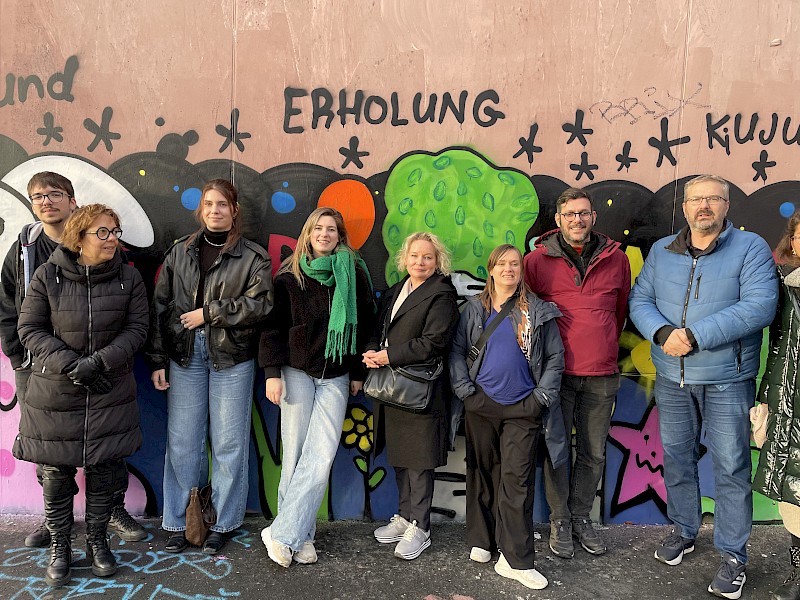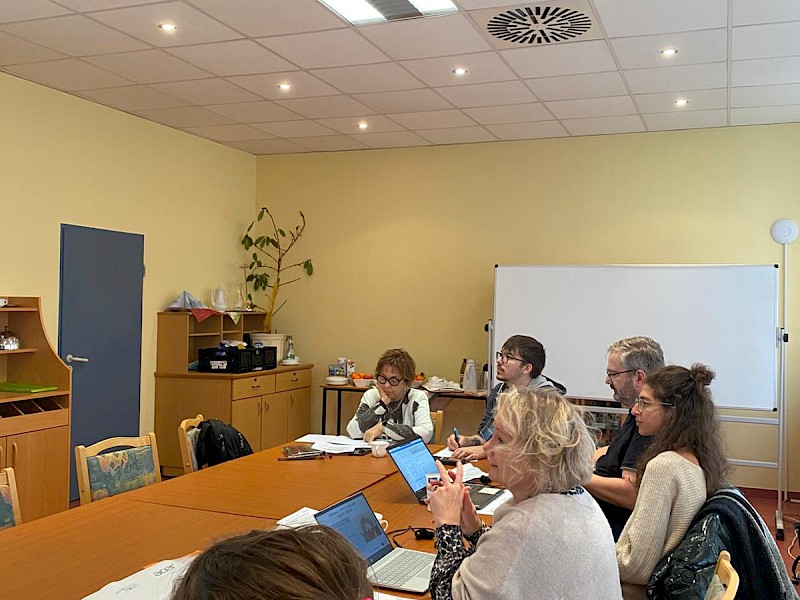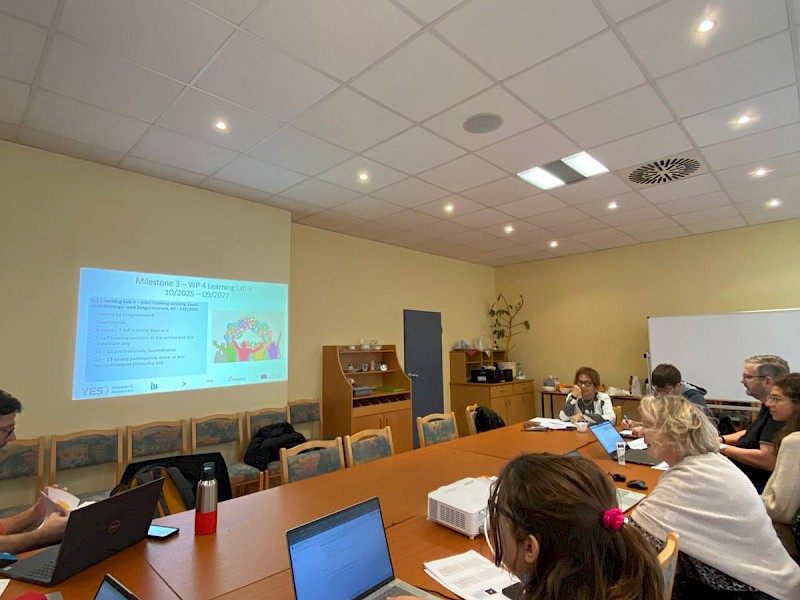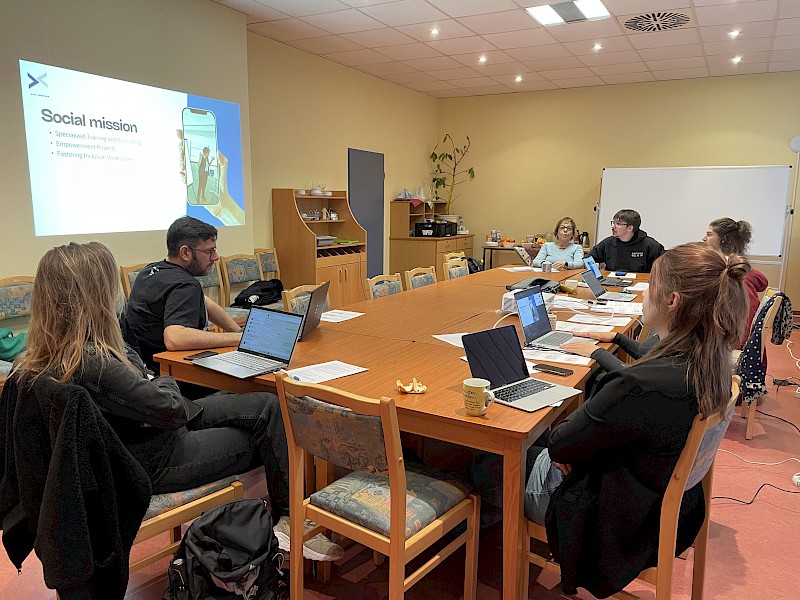The background
The NeuroDiversity from a Female Perspective projectseeks toclose knowledge gaps by incorporating expert knowledge and creating an inclusive environment for professionals and young people. There is a significant lack of knowledge about how autism and ADHD affect different genders, with girls often being diagnosed late or less frequently. This knowledge gap prevents appropriate support.
Why are we focussing on females?
The background to this is that the diagnostic procedures are outdated, on the one hand, and that very little is known about gender-specific differences, on the other hand, when it comes to ADS and Autism.
While there is still talk of fidgets, there is too little knowledge about how we can work appropriately with girls who have ADS or autism, both in youth work and in the context of school social work and, of course, other youth work offers.
Current challenges
- Gender is adding another layer and makes it more specific.
- Little knowledge about gender-specific differences in neurodivergent (young) people.
- Diagnostics are male-dominated.
- Girls* and young women* are diagnosed late, incorrectly or not at all.
- No/little consideration of gender-specific differences in everyday life or rapid relegation to a specific track, especially at school.
- There is a lack of suitable services for these young people from professionals.
- There is a lack of knowledge about how neurodivergent colleagues can be integrated into teams and their needs for a good working environment.
The activities
The project will provide training activities for professionals to improve their understanding of neurodiversity, adopt a gender- sensitive approach and ensure that all people, especially neurodiverse young people, receive the support they need.
Starting with an intensive knowledge exchange on gender-sensitive working, autism and ADHD, complemented by external opinions from business and academia, this will be followed by two training activities with neurodiverse and non-neurodiverse people.
The results
As a result of the project, various checklists will be produced with methods and tips for integrating young neurodivergent women and diverse young people into youth work.
Furthermore, explanatory videos will be created for organisations to integrate neurodivergent colleagues better. Finally, young people will develop podcasts and/or video statements. This will be a participatory decision of the advisory board and other neurodiverse young people during a joint training event.
Good practices
This publication presents the outcomes of all partners’ national research on good practice in the field of neurodivergence and neurodiversity from a gender perspective.
Based on desk research, it aims to provide an overview of gender-specific services for girls* and young women* affected by autism and/or AD(H)D, ideally within the framework of girls’* work.
Kick-off Meeting Dresden, 17 – 18 December 2024
The kick-off meeting for the new 'NeuroDiversity from a Female Perspective' project, hosted by IB, took place in Dresden, Germany, on December 17 and 18, 2024.
The common starting point was the exploration of the initial situation from the point of view of pedagogical practice and the state of diagnostics of ADS/Autism from the view of a gender perspective.
The challenges go beyond outdated diagnostic procedures to include a lack of understanding about gender-specific differences in neurodivergent girls* and young women*. Male-oriented diagnostics often lead to delayed or missed diagnoses, and there is little knowledge about how to effectively support these individuals in youth work, school social work, and related fields. Gender differences are often overlooked, resulting in inadequate support or unsuitable pathways. Furthermore, youth work organisations struggle to integrate neurodivergent colleagues due to limited awareness of how to create inclusive working environments. Addressing these issues requires capacity building and tailored approaches for both young people and professionals.
An intensive two-day thematic discussion took place, focusing on the five work packages and their various stages. In addition to setting the dates for 2025, the partners exchanged their expertise and identified key "pitfalls" that need to be considered.
The event concluded with a presentation followed by a discussion led by a young woman who shared her personal and professional experiences living with a neurodivergent diagnosis. Her deeply moving insights gave the entire project consortium valuable inspiration for the joint work over the next three years.
The first project milestones for 2025 include establishing an advisory board composed of young neurodivergent girls*/women*, who will serve as critical friends to support the entire project. Additionally, a desk research initiative will be launched to identify good practices, alongside the implementation of Learning Lab 1—four half-day online sessions featuring various inputs.
Project details:
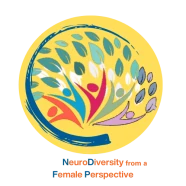
Action: KA220-YOU-BED0DB5A
Duration: 01/12/2024 – 30/11/2027
Coordinator: YES Innovation & Research
Contact: Christine Schubart,

Partners:
IB Mitte gGmbH, Dresden, Germany
Aval Asperger, Asociación Valenciana para la Inclusión laboral de personas con TEA- Asperger, Valencia, Spain
Jongerenwerk Barkema en de Haan, Baflo, The Netherlands
IEKEP, INSTITOUTO EKPAIDEFTIKOU KAI EPAGGELMATIKOU PROSANATOLISMOU, Athens, Greece.
Imprint
Information provided according to Sec. 5 German Telemedia Act (TMG):
YES Innovation & Research e.V.
Wagenburgstr. 26 - 28
70184 Stuttgart
Represented by:
Diana Neugebauer und Hans Steimle
Contact:
Telephone: +49-711-16 48 92 7
Email:
Register entry:
Registering court: Amtsgericht Stuttgart
Registration number: VR 723492
Responsible for contents acc. to Sec. 55, para. 2 German Federal Broadcasting Agreement (RstV):
Diana Neugebauer and Hans Steimle
Wagenburgstr. 26 - 28
D-70184 Stuttgart
Germany
Dispute resolution
We do not take part in online dispute resolutions at consumer arbitration boards.
Privacy Policy
Datenschutz ist für uns Ehrensache. Daher nehmen wir den Schutz Ihrer personenbezogenen Daten sehr ernst.
Nachfolgend möchten wir Sie darüber informieren, welche personenbezogenen Daten bei der Nutzung unserer Webseite verarbeitet werden und wie wir mit diesen Daten umgehen.
Inhalt
1 Verantwortlichkeit
2 Datenschutzbeauftragte
3 Allgemeines zu Datenverarbeitungen
3.1 Wichtige Begriffe
3.2 Umfang der Datenverarbeitung
3.3 Rechtsgrundlage für die Datenverarbeitung
3.4 Speicherdauer
3.5 Weitergabe von Daten
4 Einzelne Datenverarbeitungen
4.1 Besuch unserer Webseite
4.2 Kontaktaufnahme
4.3 Feedback | Interne Analyse
4.4 Newsletter
4.5 Cookies
4.5.1 Definition Cookies
4.5.2 Technisch notwendige Cookies
4.5.3 Optionale Cookies
4.5.4 Einstellungsmöglichkeiten
4.5.5 Cookies auf unserer Webseite
4.6 YouTube Videos
5 Ihre Rechte als betroffene Person
6 Links auf andere Webseiten
7 Statistik-Analyse
8 Änderung unserer Datenschutzerklärung
1. Verantwortlichkeit
Wir sind als Betreiber der Webseite www.yes-forum.eu (nachfolgend „Webseite“) für die personenbezogenen Datenverarbeitungen auf unserer Webseite im Sinne der Datenschutz-Grundverordnung („DS-GVO") verantwortlich.
Bei datenschutzrechtlichen Fragen können Sie uns gerne wie folgt kontaktieren:
YES Forum EEIG
Wagenburgstr. 26 - 28
70184 Stuttgart
Telefon: +49 711 1648927
Telefax: +49 711 1648921
E-Mail:
Internet: www.yes-forum.eu
2. Datenschutzbeauftragte
Bei allen Fragen zum Thema Datenschutz steht Ihnen unsere Datenschutzbeauftragte als Ansprechpartnerin jederzeit zur Verfügung:
...
3. Allgemeines zu Datenverarbeitungen
3.1 Wichtige Begriffe
Personenbezogene Daten sind alle Informationen, die sich auf eine identifizierte oder identifizierbare natürliche Person (nachfolgend „betroffene Person“) beziehen. Hierzu zählt insbesondere Ihr Name oder Ihre E-Mail-Adresse.
Der Begriff der Verarbeitung umfasst insbesondere die Erhebung oder Speicherung von personenbezogenen Daten.
Bitte beachten Sie, dass die verwendeten Begrifflichkeiten, wie z.B. „Nutzer“, geschlechtsneutral zu verstehen sind.
3.2 Umfang der Datenverarbeitung
Wir verarbeiten personenbezogene Daten (nachfolgend „Daten“) unserer Nutzer auf Basis der anwendbaren Datenschutzvorschriften (wie DS-GVO).
Ihre Daten werden nur verarbeitet, soweit dies für die Funktionsfähigkeit unserer Webseite sowie für die Bereitstellung unserer Leistungen erforderlich ist oder wir hierzu gesetzlich verpflichtetsind.
3.3 Rechtsgrundlage für die Datenverarbeitung
Soweit wir für die Verarbeitung personenbezogener Daten eine Einwilligung von Ihnen einholen, dient Art. 6 Abs. 1 lit. a) DS-GVO als Rechtsgrundlage.
Bei der Verarbeitung von personenbezogenen Daten, die zur Erfüllung eines Vertrages erforderlich ist, dessen Vertragspartei Sie sind, wird Art. 6 Abs. 1 lit. b) DS-GVO als Rechtsgrundlage herangezogen. Dies gilt auch für Verarbeitungsvorgänge, die zur Durchführung vorvertraglicher Maßnahmen erforderlich sind, die auf Ihre Anfrage hin erfolgen.
Soweit eine Verarbeitung personenbezogener Daten zur Erfüllung einer rechtlichen Verpflichtung erforderlich ist, der wir unterliegen, ist Art. 6 Abs. 1 lit. c) DS-GVO Rechtsgrundlage der Verarbeitung.
Ist die Verarbeitung zur Wahrung unseres berechtigten Interesses oder das eines Dritten erforderlich, dient Art. 6 Abs. 1 lit. f) DS-GVO als Rechtsgrundlage für die Verarbeitung, sofern Ihre Interessen, Grundrechte und Grundfreiheiten das erstgenannte Interesse nicht überwiegen.
Bei der Verarbeitung von besonderen Kategorien personenbezogener Daten stützen wir uns zusätzlich auf eine Rechtsgrundlage nach Art. 9 Abs. 2 DS-GVO.
Eine Verarbeitung kann auch auf mehreren Rechtsgrundlagen beruhen.
3.4 Speicherdauer
Ihre personenbezogenen Daten werden gelöscht, sobald der Zweck der Speicherung entfällt und gesetzliche Aufbewahrungsfristen (z.B. aus dem Steuerrecht) oder unsere vorrangigen berechtigten Interessen oder die eines Dritten der Löschung nicht entgegenstehen. AnonymisierteDaten ohne Personenbezug könnenohne zeitliche Begrenzung gespeichert und insbesondere zwecks interner Analysenverwendet werden.
Die konkrete Speicherdauer bzw. die Kriterien hierfür werden wir bei Bedarf an den entsprechenden Stellen näher erläutern.
3.5 Weitergabe von Daten
Eine Weitergabe personenbezogener Daten findet nur statt, wenn dies für die Vorbereitung und Durchführung eines Vertrages mit Ihnen erforderlich ist, die Weitergabe auf Basis einer Interessenabwägung i.S.d. Art. 6 Abs. 1 lit. f) DS-GVO zulässig ist, wir rechtlich zur Weitergabe verpflichtet sind oder Sie uns insoweit eine Einwilligung erteilt haben.
Mögliche Empfänger Ihrer Daten können folgende Stellen sein:
- Interne Stellen (z.B. Sekretariat)
- Auftragsverarbeiter (z.B. Hostprovider) und sonstige Vertragspartner
- Behörden bei rechtlicher Verpflichtung
Im Zusammenhang mit der Vertragserfüllung oder derDurchführung von vorvertraglichen Maßnahmen kann es imEinzelfall erforderlich sein, dass Ihre personenbezogenen Daten in einemDrittland außerhalb der EU oder des EWRverarbeitet werden. Dies geschieht nur unter Beachtung der besonderen Voraussetzungen derArt. 44 ff. DS-GVO.
Datenübermittlungen in ein Drittland können insbesondere auf Standardvertragsklauselnnach Art. 46 Abs. 2 lit. c) DS-GVO gestützt werden. Diese wurden von der EuropäischenKommission genehmigt und sollen einen angemessenen Schutz Ihrerpersonenbezogenen Daten in den betreffenden Ländern gewährleisten. Zusätzlich können Datenübermittlungen in ein Drittland auf einen sogenannten Angemessenheitsbeschluss nach Art. 45 Abs.1 DS-GVO beruhen. Die europäische Kommission stellt in einem Angemessenheitsbeschluss fest, dass ein bestimmtes Drittland (z.B. Israel) ein angemessenes Datenschutzniveau bietet.Unabhängig davon können wir die Drittlandübermittlung auch auf IhreEinwilligung nach Art. 49 Abs. 1 lit. a) DS-GVO stützen.
Sofern eine Drittlandübermittlung erfolgt, werden wir die konkreten Drittländer an den entsprechenden Stellen näher erläutern.
4. Einzelne Datenverarbeitungen
4.1 Besuch unserer Webseite
Bei jedem Aufruf und Nutzung unserer Webseite erfassen wir Daten und Informationen vom System Ihres Geräts und speichern diese in sog. Server Logfiles. Diese Daten werden automatisiert durch Ihren jeweiligen Browser übermittelt. Folgende Nutzungsdaten können hierbei von uns erfasst werden:
- IP-Adresse des anfragenden Gerätes
- Name der aufgerufenen Seite
- Datum und Uhrzeit Ihres Aufrufs
- jeweils übertragene Datenmenge und Ladezeit
- Referrer-URL (Herkunfts-URL)
- Betriebssystem
- Produkt- und Versionsinformationen des Browsers
Ohne die Erfassung der IP-Adresse und die Bezeichnung der abgerufenen Seiten ist ein Verbindungsaufbau zum Server und die Nutzung unserer Webseite nicht möglich. Darüber hinaus überträgt Ihr Browser – je nach Konfiguration – weitere Daten (vgl. oben).
Die Verarbeitung der vorgenannten Daten ist technisch erforderlich, um Ihnen den Aufruf und die Nutzung unserer Webseite zu ermöglichen. Wir benötigen diese Daten, um eine optimale Darstellung unserer Webseite und die Sicherheit unserer Systeme sicherzustellen sowie unsere Webseite stetig zu verbessern.
Rechtsgrundlage für die Verarbeitung Ihrer Daten ist Art. 6 Abs. 1 lit. f) DS-GVO (berechtigtes Interesse). Unser berechtigtes Interesse liegt darin, Ihnen eine optimale und sichere Nutzung unserer Webseite zu ermöglichen. Bei Vertragsverhältnissen dient zusätzlich Art. 6 Abs. 1 lit. b) DS-GVO (Vertragserfüllung) als Rechtsgrundlage.
Die Nutzungsdaten werden nach dem Seitenaufruf anonymisiert bzw. in der Regel nach spätestens 7 Tagen gelöscht.
4.2 Kontaktaufnahme
Über die auf unserer Webseite bereitgestellte E-Mail-Adresse können Sie uns direkt eine Nachricht schicken. In diesem Fall wird als Absender automatisch diejenige E-Mail-Adresse verwendet, die mit Ihrem E-Mail-Programm verknüpft ist. Auch ist eine telefonische Kontaktaufnahme über die auf unserer Webseite bereitgestellte Telefon- bzw. Faxnummer möglich.
Daneben können Sie uns über das Kontaktformular eine Nachricht zukommen lassen. Die Pflichtangaben sind hierbei gekennzeichnet.
Die von Ihnen bereitgestellten Daten werden von uns benötigt, um Ihre Anfrage zu beantworten und einen Vertrag vorzubereiten bzw. durchzuführen (Art. 6 Abs. 1 lit. b) DS-GVO). Danebenhaben wir ein berechtigtes Interesse daran, unsere Unternehmenszwecke infolge der Kommunikation mit Ihnen bestmöglich zu verwirklichen (Art. 6Abs. 1 lit. f) DS-GVO).
ODER (Einwilligung): Die von Ihnen bereitgestellten Daten werden von uns benötigt, um Ihre Anfrage zu beantworten. Wir stützen uns hier auf Ihre Einwilligung (Art. 6 Abs. 1 lit. a) DS-GVO).
ODER: Wenn Sie uns bei der Kontaktaufnahme besonders sensible Daten (insbesondere Gesundheitsdaten) mitteilen, gilt zusätzlich Art. 9 Abs. 2 lit. a) DS-GVO (Einwilligung bei besonders sensiblen Daten).
Wir löschen Ihre Daten, sobald die jeweilige Konversation bzw. der Vertrag vollständig beendet ist oder Sie die Einwilligung widerrufen haben, sofern keine andere Rechtsgrundlage für eine weitere Speicherung besteht (z.B. bei gesetzlichen Aufbewahrungspflichten).
4.3 Feedback | Interne Analyse
Sie können unsüber ein Formular auf der Webseite ein Feedback geben. Die Pflichtangaben sind hierbeigekennzeichnet.
Die von Ihnen bereitgestellten Datenwerden von uns benötigt, um unsere Plattform stetig zu verbessern und unsereProzesse intern zu analysieren. Daneben können wir Ihnen durch dieFeedbackoption eine aktive Mitgestaltung unserer Plattform ermöglichen. IhrFeedback hilft uns dabei, den Geflüchteten die bestmögliche Betreuunganzubieten. Die vorgenannten Zwecke begründen unser berechtigtes Interesse nachArt. 6 Abs. 1 lit. f) DS-GVO).
Wir löschenIhre Daten, sobald der Speicherzweck weggefallen ist, sofern keine andereRechtsgrundlage für eine weitere Speicherung besteht (z.B. bei gesetzlichenAufbewahrungspflichten). Anonymisierte Daten (ohne Personenbezug) können ohnezeitliche Begrenzung gespeichert und insbesondere zwecks interner Analyseverwendet werden.
4.4 Newsletter
Um spannende Informationenüber unsere Projekte, Aktionen und Events per E-Mail zu erhalten, könnenSie unseren Newsletter abonnieren. Für den Versand des Newsletters verwendenwir das sogenannte Double-Opt-In-Verfahren. Das bedeutet, dass wir Ihnen nachAnmeldung eine E-Mail mit einem Aktivierungslink senden. Erst durch Anklickendieses Links erhalten Sie den Newsletter. Neben der E-Mail-Adresse und IhremNamen (freiwillige Angabe) speichern wir zwecks Nachweispflicht undMissbrauchskontrolle die IP-Adresse unddie Zeitpunkte der Anmeldung sowie der Bestätigung. Wir benötigen diese Informationen, um Ihnen denNewsletter zu übersenden. Rechtsgrundlage für den Newsletter-Versand ist Art. 6Abs. 1 a) DS-GVO (Einwilligung).
Sie können denNewsletter jederzeit deaktivieren. Zu diesem Zweck wenden Sie sich bitte an unsoder nutzen Sie den in jedem Newsletter angegebenen Abmeldelink.
Ihre Daten werden nachWiderruf Ihrer Einwilligung gelöscht, sofern wir nicht ein berechtigtesInteresse an der weiteren Aufbewahrung haben (z.B. zwecksVertragsdurchführung). Es werden in jedem Fall nur diejenigen Daten weiterhinverarbeitet, die für die Erreichung des entsprechenden Zwecks erforderlichsind.
... siehe Modul
4.5 Cookies
4.5.1 Definition Cookies
Bei Cookies handelt es sich um kleine Textdateien, die bei Nutzung einer Webseite auf Ihrem Endgerät gespeichert und anschließend an den Webseite-Betreiber übermittelt werden. Cookies enthalten eine sog. Cookie-ID (charakteristische Zeichenfolge mit verschiedenen Informationen), wodurch eine Identifizierung Ihres Geräts beim erneuten Aufrufen der Webseite ermöglicht wird. Es ist jedoch nicht möglich, Sie als Nutzer direkt zu identifizieren.
4.5.2 Technisch notwendige Cookies
Technisch notwendige Cookies werden benötigt, um sich auf einer Webseite zu bewegen, hier die grundlegenden Funktionen fehlerfrei zu nutzen und die Sicherheit der Webseite zu gewährleisten. Die technisch notwendigen Cookies sammeln weder zu Marketingzwecken Informationen über Sie noch speichern sie, welche Webseiten Sie besucht haben. Sie haben eine unterschiedliche Lebensdauer und werden in der Regel nur für die Dauer Ihres Besuchs auf unserer Webseite gespeichert (sog. Session-Cookies).
4.5.3 Optionale Cookies
Daneben gibt es die optionalen Cookies, die für die Nutzung einer Webseite technisch nicht erforderlich sind. Diese Cookies werden über die einzelne Sitzung hinaus gespeichert. Sie können zu folgenden Zwecken verwendet werden:
a. Analytische Cookies
Diese Cookies werden gespeichert, um die individuelle Nutzung einer Webseite nachvollziehen zu können (z.B. Besuch einer bestimmten Seite). Sie dienen dazu, eine Webseite fortlaufend zu verbessern und auch zu Marketingzwecken die Präferenzen der Nutzer festzuhalten. Mithilfe dieser Cookies kann ein Webseite-Betreiber beispielsweise personalisierte Werbung auf Basis der individuellen Nutzeraktivitäten ausspielen.
b. Third-Party-Cookies
Auch kann es im Einzelfall vorkommen, dass bei Aufruf und Nutzung einer Webseite sog. „Third-Party-Cookies“ gesetzt werden. Diese Cookies stammen nicht vom Betreiber der Webseite (hier „First-Party-Cookies“), sondern von Dritten (z.B. von Google-Diensten wie YouTube). Die Drittanbieter können diese Cookies beispielsweise dazu nutzen, die Nutzeraktivitäten zwecks Werbung umfassend nachzuvollziehen (z.B. für personalisierte Angebote) oder die eigenen Dienste zu optimieren.
Ein Webseite-Betreiber verwendet in der Regel Inhalte von Drittanbietern, um die eigene Webseite fortlaufend zu verbessern und dem Nutzer das bestmögliche Nutzererlebnis zu bieten.
4.5.4 Einstellungsmöglichkeiten
Sie können Ihre Browser-Einstellungen entsprechend Ihren Wünschen konfigurieren (z.B. Deaktivierung von Cookies). Bereits gespeicherte Cookies können in den Einstellungen jederzeit gelöscht werden.
Werden Cookies für unsere Webseite deaktiviert oder gelöscht, können möglicherweise nicht mehr alle Funktionen der Webseite vollumfänglich genutzt werden (insbesondere in Bezug auf Session-Cookies).
4.5.5 Cookies auf unserer Webseite
a. Technisch notwendige Cookies
Für den Aufruf und die Nutzung unserer Webseite ist grundsätzlich nur die Speicherung von technisch notwendigen Cookies erforderlich. Wir verwenden diese Cookies zu folgenden Zwecken:
- Betrieb der Webseite
- Individuelle Gestaltung der Webseite
- Verbesserung der Benutzerfreundlichkeit
- Speicherung von Einstellungen des Nutzers (wie Spracheinstellungen, Cookie-Präferenzen)
- Vorbeugung von Betrug / Verbesserung der Sicherheit
Die Rechtsgrundlage für die Verarbeitung ist Art. 6 Abs. 1 lit. f) DS-GVO. Wir haben ein berechtigtes Interesse daran, Ihnen eine optimale und sichere Nutzung unserer Webseite zu ermöglichen. Die Zulässigkeit dieserDatenverarbeitung basiert bei Vertragsverhältnissen zusätzlich auf Art. 6 Abs.1 lit. b) DS-GVO (Vertragserfüllung).
Diese Cookies werden nach Beendigung Ihres Besuchs auf unserer Webseite gelöscht.
4.6 YouTube Videos
Wir nutzen auf unserer Webseite YouTube Videos. YouTube ist ein Dienst der Google Ireland Limited, Gordon House, Barrow Street, Dublin 4, Irland. Das Mutterunternehmen Google LLC befindet sich in den USA: 1600 Amphitheatre Parkway, Mountain View, CA 94043, USA. Beide Unternehmen werden nachfolgend zusammen als „Google“ bezeichnet. Weitere Informationen zu Google als Anbieterin von YouTube finden Sie hier: youtube.com/t/impressum
Die Einbindung von YouTube Videos erfolgt im sog. erweiterten Datenschutzmodus. Das bedeutet, dass Google bei Einbettung der Videos keine Cookies zum Erfassen Ihres Nutzungsverhaltens auf unserer Webseite setzt. Erst nach Aktivierung des Videos wird eine Verbindung zum Google-Server aufgebaut und die damit verbundenen Datenverarbeitungen ausgelöst. Hierbei kann Google unter Umständen verschiedene Informationen über Sie (auch personenbezogener Art) erheben, diese auswerten (z.B. zwecks Erstellung von Nutzungsprofilen) und für eigene Zwecke nutzen (z.B. zwecks Werbung, Marktforschung oder Gestaltung von Google-Diensten). Dabei kann nicht ausgeschlossen werden, dass Google die Informationen auch an Server bzw. Empfänger in einem Drittland (Länder außerhalb der EU/des EWR, insbesondere die USA) übermittelt. Dies erfolgt unabhängig davon, ob YouTube ein Nutzerkonto bereitstellt, über das Sie eingeloggt sind, oder ob kein Nutzerkonto besteht. Wenn Sie auf das eingebettete Video klicken und anschließend direkt zu YouTube weitergeleitet werden, könnte dort möglicherweise Ihr Nutzungsverhalten gemäß den Richtlinien und Nutzungsbedingungen von Google erfasst werden.
Auch kann nach Aktivierung des Videos eine Verknüpfung mit Ihrem YouTube-Nutzerkonto erfolgen, sofern Sie dort bzw. bei Google eingeloggt sind. Wenn Sie dies nicht wünschen, müssen Sie sich vor der Nutzung ausloggen.
Bitte beachten Sie, dass die Datenverarbeitungen seitens Google außerhalb unseres Einflussbereichs liegen und die anwendbaren Datenschutzbestimmungen von Google zu beachten sind: policies.google.com/privacy | adssettings.google.com/authenticated
Die Datenübermittlung in ein Drittland ist unter den Voraussetzungen von Art. 44 ff. DS-GVO zulässig. Google stützt Datenübermittlungen in ein Drittland insbesondere auf die Standardvertragsklauseln. Weitere Informationen zu den rechtlichen Rahmenbedingungen bei Drittlandübermittlungen finden Sie hier: policies.google.com/privacy/frameworks?hl=de
Wir verwenden YouTube, um Ihnen Videos zu verschiedenen Themen zur Verfügung zu stellen. Sollten dabei personenbezogene Daten an Google übermittelt werden, basiert die Datenverarbeitung auf Ihre Einwilligung (Art. 6 Abs. 1 a) DS-GVO und § 25 Abs. 1 TTDSG).
Ihre Einwilligung können Sie jederzeit hier oder direkt unterhalb des Videos widerrufen.
5. Ihre Rechte als betroffene Person
Als betroffene Person stehen Ihnen im Rahmen der gesetzlichen Vorgaben folgende Rechte zu:
- Auskunftsrecht nach Art. 15 DS-GVO
- Recht auf Berichtigung nach Art. 16 DS-GVO
- Recht auf Löschung nach Art. 17 DS-GVO
- Recht auf Einschränkung der Verarbeitung nach Art. 18 DS-GVO
- Recht auf Datenübertragbarkeit nach Art. 20 DS-GVO
- Recht auf Beschwerde bei der zuständigen Aufsichtsbehörde nach Art. 77 DS-GVO
Sofern Ihre personenbezogenen Daten auf Grundlage von Art. 6 Abs. 1 lit. f) DS-GVO verarbeitet werden, haben Sie ein Widerspruchsrecht, soweit dafür Gründe vorliegen, die sich aus Ihrer besonderen Situation ergeben oder sich der Widerspruch gegen Direktwerbung richtet (Art. 21 DS-GVO).
Daneben haben Sie das Recht, eine erteilte datenschutzrechtliche Einwilligung jederzeit zu widerrufen. Bitte beachten Sie, dass auch bei Widerruf die bis zum Widerruf auf Basis der Einwilligung erfolgten Verarbeitungen rechtmäßig bleiben.
Für datenschutzrechtliche Fragen und die Geltendmachung Ihrer Rechte stehen wir Ihnen gerne zur Verfügung. Die Kontaktdaten finden Sie oben unter Ziffer 1 und 2.
Hier finden Sie den vollständigen Text der DS-GVO.
6. Links auf andere Webseiten
Wenn wir Links zu anderen Webseiten bereitstellen (z.B. zu unseren Social Media Channels), gilt diese Datenschutzerklärung nicht für die Verarbeitung personenbezogener Daten durch diese Webseiten. Auf die Verarbeitung der Daten auf diesen fremden Webseiten haben wir nämlich keinen Einfluss. Wir empfehlen Ihnen daher, die Datenschutzhinweise auf den anderen von Ihnen besuchten Webseiten zu lesen.
7. Statistik-Analyse
Wir nutzen das Open-Source-Webanalysetool Matomo, um das Surfverhalten unserer Besucher anonym nachvollziehen zu können. Mithilfe von Matomo können wir entpersonalisierte Statistiken anfertigen, die uns dabei unterstützen,unsere Webseite bedarfsgerecht zu erstellen und diese fortlaufend zu optimieren. Hierbei werden folgende Daten verarbeitet:
- IP-Adresse des anfragenden Geräts
- Name der aufgerufenen Seite
- Datum und Uhrzeit Ihres Aufrufs
- Standortdaten (Land)
- Spracheinstellung des Browsers
- Produkt- und Versionsinformationen des Browsers
- Geräteinformationen (z.B. Betriebssystem)
DieIP-Adresse wird nach Erhebung sofort anonymisiert (3 Bytes), sodass dienachfolgenden Statistiken nicht mehr einer bestimmten Person zugeordnet werden können. Wir verzichten bewusst auf Cookies, um die Nutzung von Matomo so datenschutzfreundlich wie möglich zu gestalten. Das sog. Fingerprinting wird von Matomo nichteingesetzt, um die Privatsphäre der Besucher zu schützen (vgl. https://matomo.org/faq/general/how-is-the-visitor-config_id-processed/). Die (anonymisierte) IP-Adresseund die weiteren Informationen werden in deutschen Rechenzentren gespeichert,sodass eine Drittlandübermittlung ausgeschlossen werden kann.
Ohne die von Matomo erhobenen Informationen wären wir nicht in der Lage, Ihnen denbestmöglichen Service anzubieten und unsere Webseite stetig zu verbessern.Diese Zwecke stellen unser berechtigtes Interesse an der Datenverarbeitung nachArt. 6 Abs. 1 lit. f) DS-GVO dar.
8. Änderung unserer Datenschutzerklärung
Wir überprüfen unsere Datenschutzerklärung regelmäßig, um sicherzustellen, dass sie noch inhaltlichrichtig ist und den gesetzlichen Vorgaben entspricht. Sie finden die jeweils aktuelle Datenschutzerklärung auf unserer Webseite.
Stand dieser Datenschutzerklärung: 10.2022
